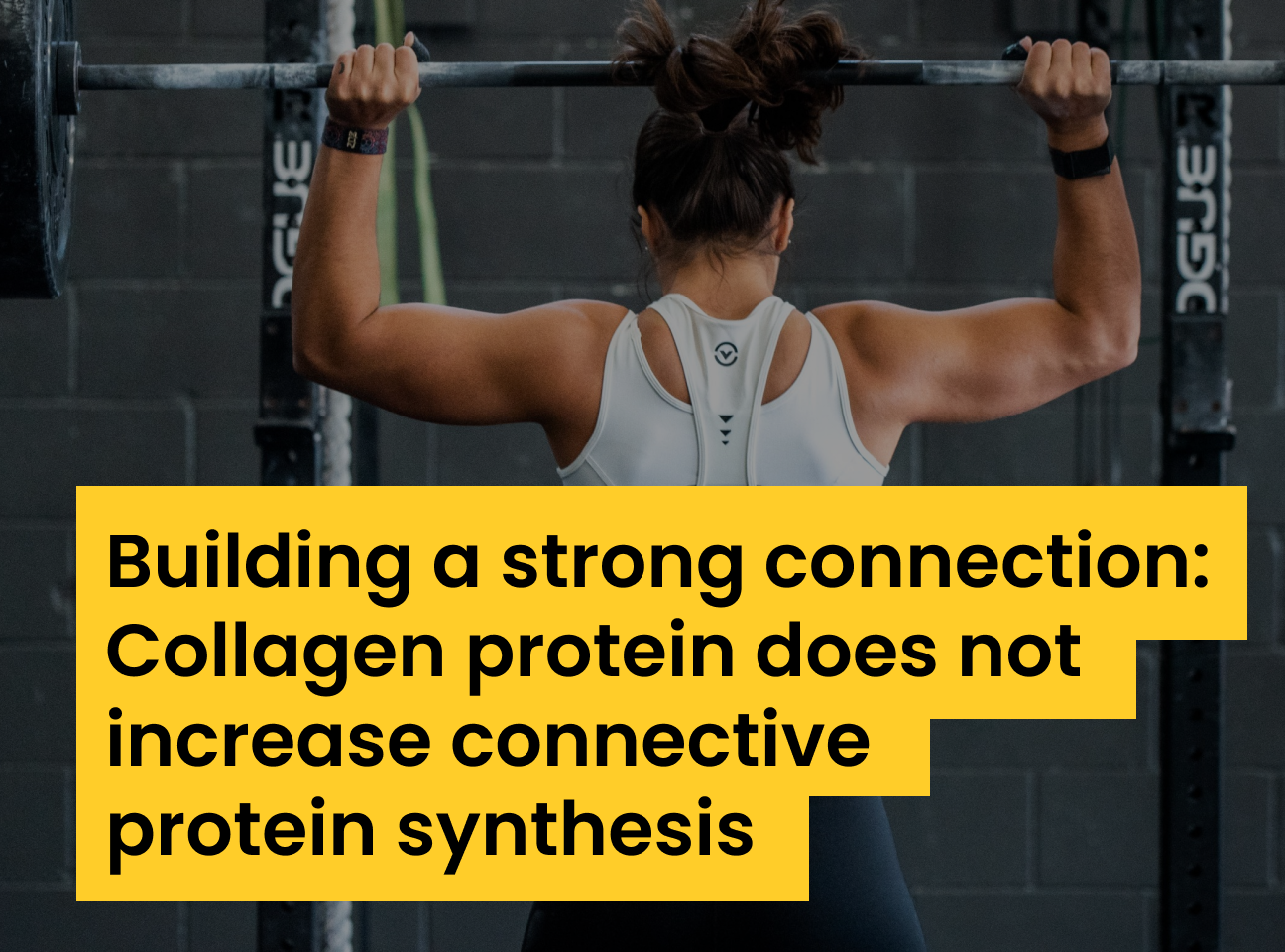
Building a strong connection: Collagen protein does not increase connective protein synthesis
By Dr. Mark Hearris

Research: Collagen Protein Ingestion during Recovery from Exercise Does Not Increase Muscle Connective Protein Synthesis Rates by Aussieker et al. (2023) (open access)
Context: As nutrition practitioners, we often focus on maximising the synthesis of myofibrillar proteins — the key apparatus that allow us to generate force — after resistance exercise by consuming high-quality proteins, such as whey protein. Over recent years, enhancing the synthesis of connective proteins, which play a critical role in transferring this force, has been a topic of hot debate and has seen the rise in popularity of collagen-rich supplements as a potential nutritional strategy to support this. Unlike other protein sources such as whey, collagen protein provides high levels of the amino acids glycine, proline and hydroxyproline which are highly abundant in connective proteins and is thought to be a superior protein source to promote connective protein synthesis. Although previous research using human plasma following the ingestion of collagen protein has shown collagen protein can stimulate collagen synthesis on engineered ligaments (Shaw et al., 2017) these new data from Luc van Loon’s group are the first to test this experimental hypothesis in humans.
The study: In this design, 45 participants with resistance training experience (minimum of 6 months) were split into three different groups. All participants completed 6 sets of barbell squats, using a pyramid rep scheme (15, 12, 10, 10, 8 and 8 reps per set) with a load of 60% of 1RM (equating to approximately 69 ± 20 kg) and, following this, received either 30 g whey protein, 30 g collagen protein or a placebo drink. Myofibrillar and connective protein synthesis were measured by providing participants with a constant infusion of amino acids (known as isotopes) and collecting biopsy samples from the quadriceps immediately post-exercise and again five hours later. To determine amino acid concentrations within the blood as well as markers of whole-body collagen turnover, blood samples were collected from the hand at regular intervals (30 mins for the first 2 hours and 60 mins thereafter).
Findings: When looking at the concentration of amino acids within the blood, those who consumed whey protein demonstrated higher amounts of essential amino acids and leucine across the five-hour period following exercise when compared with those who consumed collagen protein. In addition to this, myofibrillar protein synthesis was enhanced after ingesting whey protein but remained unchanged in both the collagen and placebo groups – likely due to the lower availability of essential amino acids and leucine. In relation to the amino acids glycine, proline and hydroxyproline, those who consumed the collagen protein demonstrated much higher concentrations of these amino acids as would be expected. Despite this, muscle connective protein synthesis remained unchanged across all three treatment groups – even for those who consumed the placebo drink!
Relevance: If the synthesis of new myofibrillar proteins is the goal, these data suggest that whey protein is superior when compared with collagen due to its higher concentrations of essential amino acids and leucine. However, when the focus is on connective proteins it seems that neither collagen or whey provide any additional benefit, despite the high levels of circulating glycine, proline and hydroxyproline after collagen ingestion. The reason for this is unclear but may have something to do with the low collagen content of muscle tissue (5%) when compared with other tissues that are rich in collagen such as the connective proteins in ligaments and tendons (85%). Given that collagen supplements are one of the hottest trending supplements across sports nutrition at present, I would expect to see more research to help provide insights into some of these unanswered questions.
Recommended listening: Complement this research with the We Do Science podcast episode: Collagen peptides for injury prevention and tissue repair with Dr Laurent Bannock and Prof. Keith Baar.
References:
Shaw, G., Lee-Barthel, A., Ross, M. L., Wang, B., & Baar, K. (2017). Vitamin C–enriched gelatin supplementation before intermittent activity augments collagen synthesis. The American Journal of Clinical Nutrition, 105(1), 136–143. https://doi.org/10.3945/ajcn.116.138594
